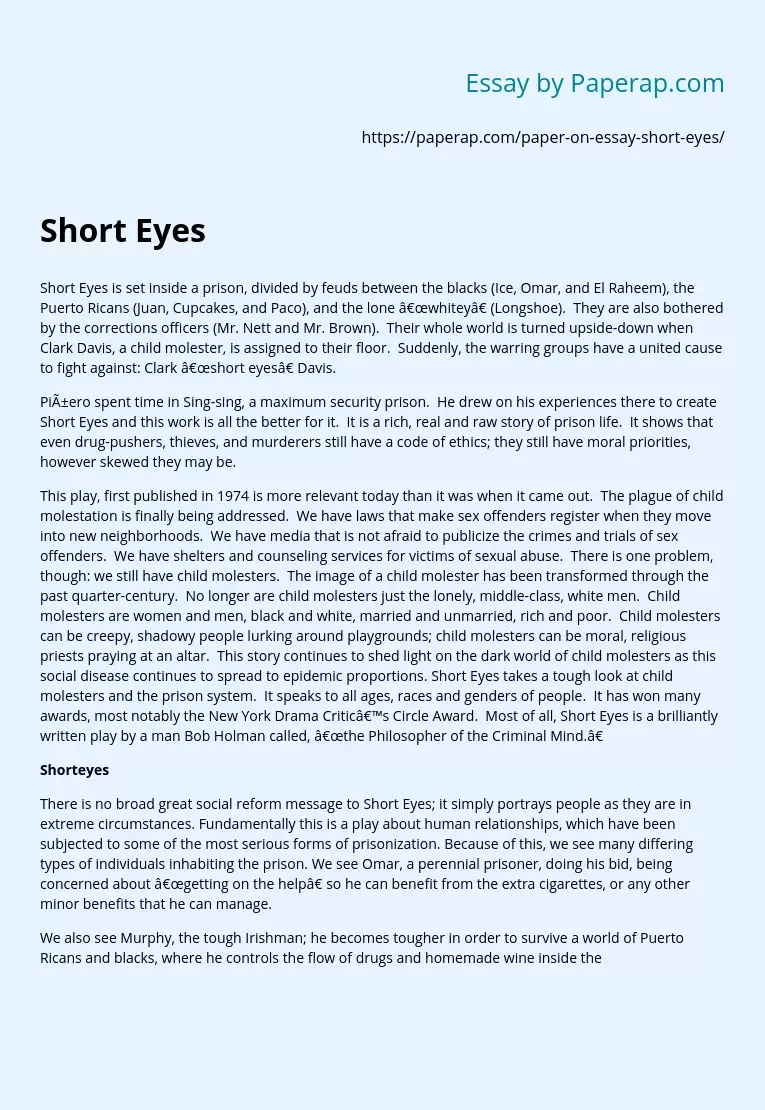Short Eyes Essay
Short Eyes is set inside a prison, divided by feuds between the blacks (Ice, Omar, and El Raheem), the Puerto Ricans (Juan, Cupcakes, and Paco), and the lone “whitey” (Longshoe). They are also bothered by the corrections officers (Mr. Nett and Mr. Brown). Their whole world is turned upside-down when Clark Davis, a child molester, is assigned to their floor. Suddenly, the warring groups have a united cause to fight against: Clark “short eyes” Davis.
Piñero spent time in Sing-sing, a maximum security prison.
He drew on his experiences there to create Short Eyes and this work is all the better for it. It is a rich, real and raw story of prison life. It shows that even drug-pushers, thieves, and murderers still have a code of ethics; they still have moral priorities, however skewed they may be.
This play, first published in 1974 is more relevant today than it was when it came out. The plague of child molestation is finally being addressed.
We have laws that make sex offenders register when they move into new neighborhoods. We have media that is not afraid to publicize the crimes and trials of sex offenders. We have shelters and counseling services for victims of sexual abuse. There is one problem, though: we still have child molesters. The image of a child molester has been transformed through the past quarter-century.
No longer are child molesters just the lonely, middle-class, white men. Child molesters are women and men, black and white, married and unmarried, rich and poor.
Child molesters can be creepy, shadowy people lurking around playgrounds; child molesters can be moral, religious priests praying at an altar. This story continues to shed light on the dark world of child molesters as this social disease continues to spread to epidemic proportions. Short Eyes takes a tough look at child molesters and the prison system. It speaks to all ages, races and genders of people. It has won many awards, most notably the New York Drama Critic’s Circle Award. Most of all, Short Eyes is a brilliantly written play by a man Bob Holman called, “the Philosopher of the Criminal Mind.”
There is no broad great social reform message to Short Eyes; it simply portrays people as they are in extreme circumstances. Fundamentally this is a play about human relationships, which have been subjected to some of the most serious forms of prisonization. Because of this, we see many differing types of individuals inhabiting the prison. We see Omar, a perennial prisoner, doing his bid, being concerned about “getting on the help” so he can benefit from the extra cigarettes, or any other minor benefits that he can manage.
We also see Murphy, the tough Irishman; he becomes tougher in order to survive a world of Puerto Ricans and blacks, where he controls the flow of drugs and homemade wine inside the prison. Clark Davis represents an emotionally disturbed man from an emotionally disturbed society. His death is the result of the rigidity of social values and morals in the prison world. Essentially, the morals that run throughout Short Eyes are the same as those of the outside world, but the prison setting has intensified them and their consequences. Prison it its own isolated society within the broader outside society.
El Raheem represents a search for self through original religion. While he is not a Muslim or a Black Panther, he uses many of the same methods to educate himself and others to the natural state of the black man. Accordingly, his inability to kill reflects this aspect of his personality: it is not an act of cowardice, but a showing of humanity.
Not surprisingly, reaction to the play and the subsequent film has been mixed. Some have claimed that it is not an appealing play because none of the characters can be identified with. However, this should not be how the play is viewed. Instead, the audience should recognize the humanity of the characters, in all their flaws and horrors, and accept that such people truly exist.
Short Eyes Essay. (2019, Dec 05). Retrieved from https://paperap.com/paper-on-essay-short-eyes/

